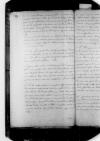Letter #5743
Alfonso de VALDÉS to Ioannes DANTISCUSs.l., [a few days after 1528-10-12]
English register: Valdés is glad that Dantiscus arrived safely. The chancellor [Mercurino Gattinara] has stopped here because he didn’t like his quarters in Pínto. The chancellor feels better. Dantiscus will always be a welcome guest. Valdés invites Dantiscus to dinner the next day; if Dantiscus is unable to come, Valdés will try to visit him later. He is happy about Dantiscus’ gifts, but he can wait for them until Dantiscus' departure. They say that after the imperial army’s victory [over the French army and fleet near Naples], two envoys were sent to the Pope for money – a German and a Spaniard.
Manuscript sources:
Auxiliary sources:
Prints:
| ||||||||||||||||||||
Text & apparatus & commentaryPlain textText & commentaryText & apparatus
Salutem.
Te salvum advenisse vehementer gaudeo.
ms 1 2 Quandocumque
⌈Quando umquam
print 1 Quando umquam
,
ms 1 2 Quandocumque
⌉ ad
ms 1 2 poteras⌈potesprint 1 potes,
ms 1 2 poteras⌉ ea ad discessum usque tuum servare. Vale.
print 1 Tuus Valdesius,
ms 1 2 omitted⌈Tuus
ms 1 2 omitted⌉
Postscript:
Audivimus exercitum caesareum post adeptam
victoriam[2] duos oratores, Germanum
alterum, alterum Hispanum ad
ms 1 2 pecunias⌈pecuniamprint 1 pecuniam,
ms 1 2 pecunias⌉ extorqueant.
cf. Sen. Con. 1. 1. 17. 9 O graves, Fortuna vices tuas; Dantisci Carmina I 3, l. 5-6 Fortunae anfractus varios et flabra notabam / Nubila, multiplices mutat ut illa vices; Dantisci Carmina I 3, l. 483 Sic variat Fortuna vices ⌊Sic mutat fortuna vicescf. Sen. Con. 1. 1. 17. 9 O graves, Fortuna vices tuas; Dantisci Carmina I 3, l. 5-6 Fortunae anfractus varios et flabra notabam / Nubila, multiplices mutat ut illa vices; Dantisci Carmina I 3, l. 483 Sic variat Fortuna vices ⌋
[1] Apud divum Hieronymum could mean “like in a royal residence”.
[2] Victoria – perhaps the capture of Milan (1526-07-24) at the beginning of the conflict between Charles V and the League of Cognac, or any subsequent minor success of the imperial troops in Italy. Identities of the mentioned envoys of the imperial army are not known, the Spanish one could be

 BK 222, No. 47, p. 187
BK 222, No. 47, p. 187